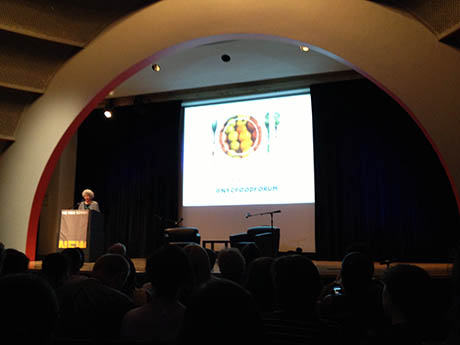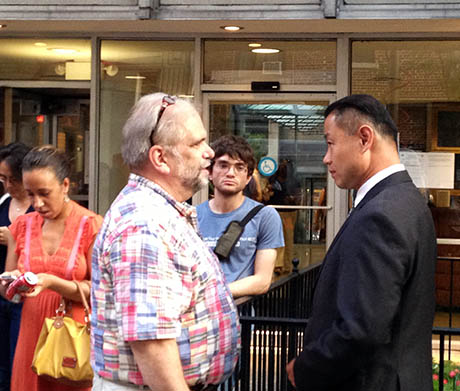
IMAGE: Of New York City’s eleven 2013 Mayoral candidates, six attended the city’s first ever Food Forum. Original photograph via The New York Times; red Xs added by me to mark non-attendees.
Those of us who care about the human and environmental inequalities, injustices, and insanity in the American food system are often encouraged to vote with our forks. But even those who advocate constructive consumption admit that, in the end, substantive change also requires political action. And, with the U.S. Congress currently making an unbelievable ass of itself over the Farm Bill, it seems increasingly clear that innovative, progressive food-related policy ideas and experiments are much more likely to be implemented at the urban, rather than the federal, level.
In my current home city of New York, Mayor Bloomberg, whose food policies have included menu calorie listings (an idea that has since been picked up at the federal level), mobile fruit and vegetable carts in food deserts, and a ban on supersized sodas (currently battling legal challenges), is reaching the end of his third and final term.
With elections in November, NYC Mayoral candidates are already packing their days with church breakfasts, fundraising dinners, and political rallies. This evening, however, six of the eleven candidates came to The New School’s Tishman Auditorium, for the first ever Mayoral Candidate Forum on the Future of Food in New York City.

IMAGE: Marion Nestle introduces the evening’s format. Apologies for my genuinely awful iPhone photos.
With more than 1,000 people in the audience (many crammed into overflow rooms after the event sold out) and more watching online, moderator Marion Nestle introduced the evening by pointing out that, regardless of what any of the candidates said, the real significance of the event was the event itself.
In other words, the fact that the growing number of people who think that food has a vital role to play in shaping our future could unite, despite their frequently divergent views on what exactly that role should be, and, as a group, muster enough clout to compel the majority of the candidates (and almost all of the front-runners) to address their questions, is a significant step toward being able to influence food policy with something more than our forks.
It was as well to appreciate that achievement up front, because the format of the evening ensured that there could be no truly substantial discussion. For reasons that I think had to do with the fact that a coalition of non-profits was hosting the event, Nestle was not allowed to “get into any arguments,” as she put it — or even, it seemed, ask for more details on a vague response or point out when a candidate was not answering the question. “You have no idea how hard this is for me,” Nestle admitted, during a brief interlude as we waited for two late-comers, candidates Christine Quinn and John Liu.

IMAGE: Nestle’s facial expressions during her conversation with John Catsimatides were expressive, to say the least.
The organisations behind the event had come up with a series of nine questions, of which each candidate was asked three or four, supplemented by a question from a community group. The questions tackled major themes: hunger, health, food worker livelihoods, food access, school meals, urban agriculture, the future of the Hunts Point Produce Market, and the city’s own institutional food purchasing and food governance structures.
Interestingly, John Catsimatides, the only Republican in attendance, is also the CEO of Gristedes, the city’s largest supermarket chain. “Of all the candidates, I’m probably the most knowledgeable about food,” he began, which may be true as far as the economic realities underlying New York City’s grocery business are concerned, but not, it seemed, much further.
In response to the question of what steps he would take to reduce hunger in New York City, Catsimatides pointed out that in New York City, rent eats 10 percent of a supermarket’s sales, whereas in neighbouring New Jersey, that cost only represents 1.5 percent of sales. He proposed using incentives to mitigate that difference and bring down food prices, as well as zoning regulations that would require new buildings to rent to grocery stores.
Beyond these two supermarket-friendly policies, however, Catsimatides either dodged the questions altogether or answered with meaninglessly vague bromides: “I would encourage people to have a better living wage,” for example, or “I believe in organic foods.”

IMAGE: Nestle asks candidate Bill de Blasio a question.
Sal Albanese, a former school teacher turned City Council member turned finance company marketing director, was similarly vague for the most part (“school food needs to be better … under an Albanese administration we would move in that direction”), but, in an answer about what he would do to increase urban agriculture on the 5,000 acres of vacant, city-owned land, he impressed me with his commitment to not accept campaign contributions from real estate developers, who exert huge pressure on the administration to siphon at least some of that land toward luxury condos.
When asked about food-releated health initiatives, Albanese approved of Bloomberg-style bans, but argued that blame for the New York’s obesity and diabetes epidemics should be laid at the door of the city’s chronic income inequality (which he proposed to address through living wage requirements on city contracts).
Anthony Weiner, the current front-runner (likely based on residual name recognition from an unfortunate sexting incident or six) disagreed, describing Bloomberg’s initiatives as “too small-minded.” Instead, he suggested a carrot rather than stick approach, in which SNAP food stamp benefits would double in value if spent on fresh produce, but also touted his plan for a single payer, universal healthcare system that would also include undocumented immigrants as a much more important way to improve New Yorkers’ health.
Christine Quinn, who launched the impressive FoodWorks NYC action plan as City Council speaker, had the most Bloombergian reply to the health question: a practical proposal to compel anything marketed as a kid’s meal to at least meet USDA standards. Her answers as a whole were the most specific, if not the most inspirational: Rather than bold promises, such as Weiner’s universal healthcare proposal or John Liu‘s push for a $11.50 minimum wage (up from $7.25 per hour), Quinn pledged to livestream food advisory council meetings, send children from the poorest households home with food pantry supplies for the weekend, and cross-reference benefits rolls to ensure everyone eligible for nutritional assistance receives it.

IMAGE: John Liu talks with audience members outside.
In the end, perhaps the most revealing aspect of the evening were the topics candidates chose not to mention. Only Bill de Blasio, currently the city’s Public Advocate, mentioned climate change and “the problems created by consumerism,” in reference to his plan to harness New York City’s institutional purchasing power (the second largest in the country, after the military) to create a market for sustainable packaging and sustainably grown produce. Only Weiner mentioned “a realistic immigration policy” — code for immigration reform — in order to address the low wages endemic to the food industry (a shocking 14 percent of food system workers rely on food stamps themselves, compared to an 8 percent average across all sectors). And only Quinn promised to actually set food policy goals and indicators, and publish progress toward them.
On that note, as Marion Nestle pointed out in her closing remarks, the second most signficant outcome of the evening’s event was that, whoever wins the race in November, we all heard their promises, and can work together to ensure they are not forgotten.
Thanks to coh-hosts Brooklyn Food Coalition, City Harvest, Food Bank, Food Chain Workers Alliance, Food Systems Network NYC, Hunger Action Network of NYS, Just Food, The New School, NRDC Action Food, NYC Coalition Against Hunger, NYC Food Policy Center at Hunter, and Public Health Solutions for making this important event happen.
